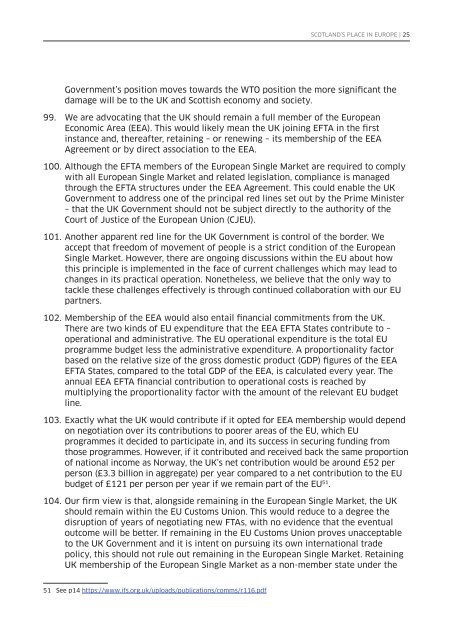Scotland’s Place in Europe
5tSyKxiOE
5tSyKxiOE
Create successful ePaper yourself
Turn your PDF publications into a flip-book with our unique Google optimized e-Paper software.
SCOTLAND’S PLACE IN EUROPE | 25<br />
Government’s position moves towards the WTO position the more significant the<br />
damage will be to the UK and Scottish economy and society.<br />
99. We are advocat<strong>in</strong>g that the UK should rema<strong>in</strong> a full member of the <strong>Europe</strong>an<br />
Economic Area (EEA). This would likely mean the UK jo<strong>in</strong><strong>in</strong>g EFTA <strong>in</strong> the first<br />
<strong>in</strong>stance and, thereafter, reta<strong>in</strong><strong>in</strong>g – or renew<strong>in</strong>g – its membership of the EEA<br />
Agreement or by direct association to the EEA.<br />
100. Although the EFTA members of the <strong>Europe</strong>an S<strong>in</strong>gle Market are required to comply<br />
with all <strong>Europe</strong>an S<strong>in</strong>gle Market and related legislation, compliance is managed<br />
through the EFTA structures under the EEA Agreement. This could enable the UK<br />
Government to address one of the pr<strong>in</strong>cipal red l<strong>in</strong>es set out by the Prime M<strong>in</strong>ister<br />
– that the UK Government should not be subject directly to the authority of the<br />
Court of Justice of the <strong>Europe</strong>an Union (CJEU).<br />
101. Another apparent red l<strong>in</strong>e for the UK Government is control of the border. We<br />
accept that freedom of movement of people is a strict condition of the <strong>Europe</strong>an<br />
S<strong>in</strong>gle Market. However, there are ongo<strong>in</strong>g discussions with<strong>in</strong> the EU about how<br />
this pr<strong>in</strong>ciple is implemented <strong>in</strong> the face of current challenges which may lead to<br />
changes <strong>in</strong> its practical operation. Nonetheless, we believe that the only way to<br />
tackle these challenges effectively is through cont<strong>in</strong>ued collaboration with our EU<br />
partners.<br />
102. Membership of the EEA would also entail f<strong>in</strong>ancial commitments from the UK.<br />
There are two k<strong>in</strong>ds of EU expenditure that the EEA EFTA States contribute to –<br />
operational and adm<strong>in</strong>istrative. The EU operational expenditure is the total EU<br />
programme budget less the adm<strong>in</strong>istrative expenditure. A proportionality factor<br />
based on the relative size of the gross domestic product (GDP) figures of the EEA<br />
EFTA States, compared to the total GDP of the EEA, is calculated every year. The<br />
annual EEA EFTA f<strong>in</strong>ancial contribution to operational costs is reached by<br />
multiply<strong>in</strong>g the proportionality factor with the amount of the relevant EU budget<br />
l<strong>in</strong>e.<br />
103. Exactly what the UK would contribute if it opted for EEA membership would depend<br />
on negotiation over its contributions to poorer areas of the EU, which EU<br />
programmes it decided to participate <strong>in</strong>, and its success <strong>in</strong> secur<strong>in</strong>g fund<strong>in</strong>g from<br />
those programmes. However, if it contributed and received back the same proportion<br />
of national <strong>in</strong>come as Norway, the UK’s net contribution would be around £52 per<br />
person (£3.3 billion <strong>in</strong> aggregate) per year compared to a net contribution to the EU<br />
budget of £121 per person per year if we rema<strong>in</strong> part of the EU 51 .<br />
104. Our firm view is that, alongside rema<strong>in</strong><strong>in</strong>g <strong>in</strong> the <strong>Europe</strong>an S<strong>in</strong>gle Market, the UK<br />
should rema<strong>in</strong> with<strong>in</strong> the EU Customs Union. This would reduce to a degree the<br />
disruption of years of negotiat<strong>in</strong>g new FTAs, with no evidence that the eventual<br />
outcome will be better. If rema<strong>in</strong><strong>in</strong>g <strong>in</strong> the EU Customs Union proves unacceptable<br />
to the UK Government and it is <strong>in</strong>tent on pursu<strong>in</strong>g its own <strong>in</strong>ternational trade<br />
policy, this should not rule out rema<strong>in</strong><strong>in</strong>g <strong>in</strong> the <strong>Europe</strong>an S<strong>in</strong>gle Market. Reta<strong>in</strong><strong>in</strong>g<br />
UK membership of the <strong>Europe</strong>an S<strong>in</strong>gle Market as a non-member state under the<br />
51 See p14 https://www.ifs.org.uk/uploads/publications/comms/r116.pdf


